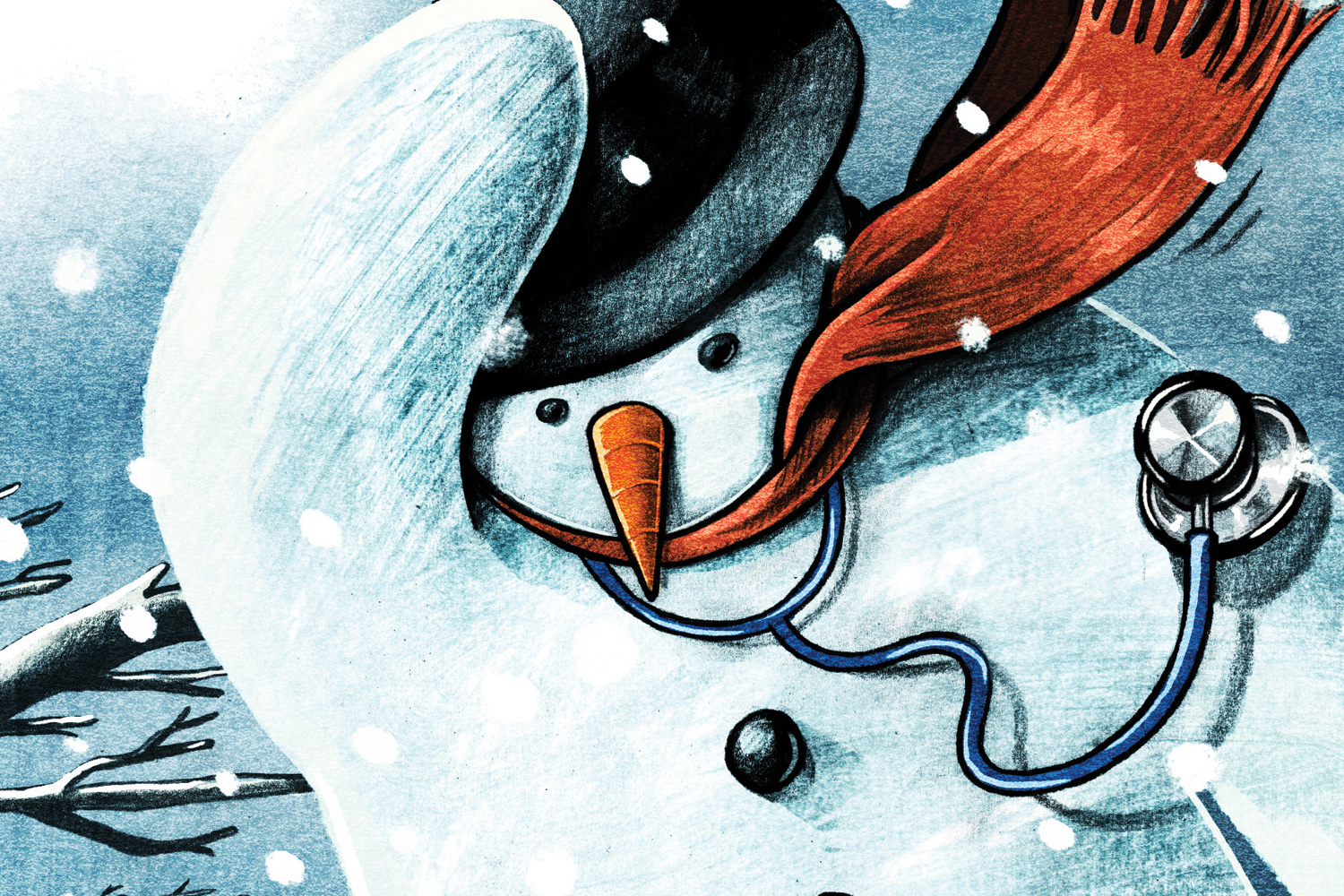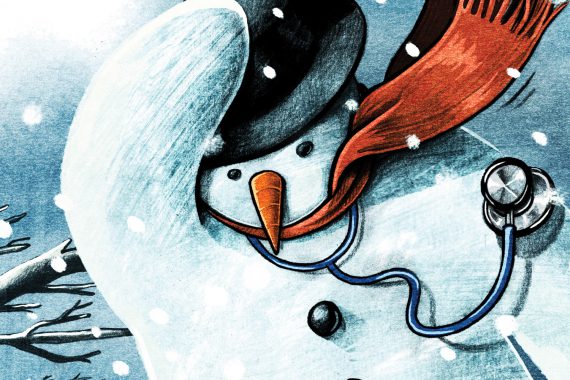
snowman nov2017 ben jennings 3×2
The NHS is bracing itself for what could be the worst winter in decades, but GPs shouldn’t expect any early Christmas presents to help them cope.
Hospital trusts in England have received three waves of funding this year – totalling £100m – to help them prepare, and social care has been given a cash boost of £2bn to boost capacity. Similar winter plans in Scotland focus almost exclusively on secondary care. These plans are unlikely to avert the coming nightmare – but primary care doesn’t even have that support to rely on.
Officials warn they are ‘more scared than they have ever been’ about this winter, and GP leaders say a bad flu season – as predicted by experts – could ‘just blow us up’. But a Pulse analysis of winter plans from 18 areas in England and Scotland reveals scant support for general practice. Quite the opposite: most of the plans involve GPs pitching in to help relieve the pressure on secondary care.
The analysis shows most of the additional winter funding will be used for the GP ‘front-door streaming service’ in every A&E department mandated by NHS England to manage demand. CCGs are also relying heavily on GPs to provide extended access, with several areas asking GPs to open on bank holidays. Yet none of the winter plans detail any extra funding for primary care this winter.
I still don’t think we’ll be able to cope -Dr Anu Rao
In Scotland, an extra £5m in funding is designed to speed up discharges and encourage patients to use minor injuries units rather than A&E. Wales and NI have yet to reveal their plans.
NHS England has announced it will extend its winter scheme to reimburse indemnity for extra out-of-hours shifts by GPs and there has been a £10m extension to the flu vaccination scheme to include care home workers. But compared with the millions being spent on bailing out A&E departments this is small fry, and involves GPs doing extra work.
’Dr Anu Rao, medical officer at Leicester, Leicestershire and Rutland LMC, says she has spoken to NHS England and her CCG and ‘there is no extra funding at all’ for in-hours GP care.
She says: ‘I think this winter is going to be very hard on us so we’re already anticipating extra appointments, but I still don’t think we’ll be able to cope.’
Lincolnshire LMC medical director Dr Kieran Sharrock agrees, saying ‘local commissioners seem to forget the vital role’ of GPs. The winter plans for his area ‘seem very hospital focused’, he adds.
Last winter was brutal in the NHS, with ambulances queuing outside A&E departments and patients left on trolleys. At one point the Red Cross even stepped in to help and controversially equated the situation to a ‘humanitarian disaster’. But it was not even a cold winter, and levels of circulating flu were not particularly high.
Winter planning – where are we?
England
• £100m invested in trusts to allow GPs to work in A&Es for minor illnesses and streaming
• NHS 111 upgraded so 36% of calls are dealt with by clinicians, up from 22% last winter
• An extra £10m Invested into flu programme to allow free vaccination of care home staff by GPs and pharmacists
• ‘Delayed transfers of care’ targets implemented for councils and NHS bodies, which is estimated to free up 2,500 beds;
• Emergency medicine training places increased to help in the future
• Local winter plans, which include plans for extended GP access, including on bank holidays
Scotland
• An extra £5m in funding for NHS boards’ planning and resilience
• More staff to help with weekend discharges
• Campaign to encourage patients to visit minor injuries units instead of A&E
• £50m for longer-term measures
to improve secondary care waiting times and efficiency and £9m for A&E
Wales
• Government to unveil measures this month, including integrated winter plans drawn up by health boards, ambulance services and local authorities
• RCGP Wales has called for hospital staff to be moved into practices, remote telephone triaging and overspill hubs with physiotherapy, pharmacy and mental health support
Northern Ireland
• Collapse of a functioning Government has hampered preparation
• A spokesperson said: ‘All five NI health trusts and the Health and Social Care Board are at an advanced stage of preparations with resilience plans on dealing with winter pressure’
This year could be much harder, with drastic consequences for practices. The flu season in Australia was the worst in decades, with the H3 strain evolving during the season. This is a reliable indicator for the same in the Northern Hemisphere and it is too late to change the vaccines that GPs have ordered.
NHS England chair Professor Sir Malcolm Grant told delegates at the National Children and Adult Services Conference last month that NHS England is ‘more scared than we have ever been’ about the upcoming winter pressures. He further warned that there is a ‘strong likelihood of hospitals being inundated with people suffering flu’.
But as RCGP chair Professor Helen Stokes-Lampard points out: ‘It’s not just emergency departments that face increased workload over the colder months – every GP is all too aware that more patients consult with infectious illnesses in winter.’ Meanwhile, Family Doctor Association chair Dr Peter Swinyard says a bad flu season ‘could just blow us up’.
We are more scared than ever- Professor Malcom Grant
Secondary care is already struggling to cope, despite all the additional funding and preparation (see box). An NHS Confederation poll of some 130 senior leaders found more than 90% of health and care leaders across England are ‘concerned’ about their organisation’s ability to cope this winter, with 62% ‘extremely concerned’. This turmoil will heap further pressure on GP practices, with patients unable to get timely urgent care and referrals blocked. Despite this, the profession is being called on to help directly.
Ipswich GP Dr David Egan tells Pulse he is already being asked to do ‘ward rounds in nursing homes before bank holidays’ and Pulse reported last month that GPs in Lincolnshire have been asked to review referrals in an effort to tackle a backlog of 30,000 patients waiting for treatment at one trust.
A Pulse investigation into the GP ‘streaming’ service at 139 trusts with major A&E departments found that nearly all are planning at least 12 hours of GP coverage a day in the department. Of the trusts that were able to respond with detailed plans, 22 are planning to have one GP available at a time, while four expect to have up to three GPs working at any one time.
They are using different recruitment methods, from relying on local GPs to national advertising. There is no indication whether they are targeting locums, partners or salaried staff.
But this is occurring at a time of a widespread GP shortages. Indeed, chair of out-of-hours representative body Urgent Health UK Dr Simon Abrams warned that workforce constraints have led to A&E departments appointing ‘quite inexperienced GPs’.
They are happy to move GPs to A&E but not the other way – Dr Rebecca Payne
NHS England points to the £2.4bn extra promised a year by 2020 in the GP Forward View as evidence of its support for primary care, adding that ‘local winter contingency plans are just that – local decisions’. But there are other solutions health authorities could deploy.
RCGP Wales chair Dr Rebecca Payne has called for overspill hubs, remote telephone triage and shifting hospital staff into surgeries. ‘They are happy to move staff to A&E but we don’t have staff moving into general practice,’ she says.
There is also a solution the DH implemented in 2009 for the bird flu pandemic – transferring all patients from GP surgeries to a specialised flu clinic, cutting GP workload overnight. But the DH has ruled this out, so it looks as if GPs will have to struggle on. Let’s hope their ability to do so can carry the profession through to the spring.
Pulse July survey
Take our July 2025 survey to potentially win £1.000 worth of tokens












